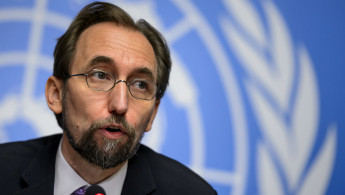Syria's war criminals will be punished, rights chief promises
Suspected war criminals in Syria will one day face justice for crimes against civilians, particularly as evidence against them increases, the UN High Commissioner for Human Rights said on Thursday.
As the fourth anniversary of the Syrian conflict approaches, Zeid Raad al-Hussein said that justice would be done for the victims of war crimes.
"We have a massive amount of evidence, there are lists with people's names on them," Zeid said in a joint interview with UN High Commissioner for Refugees Antonio Guterres conducted by CNN's Christiane Amanpour.
"It may not be immediate... but as we go through this transition from total impunity to justice being realised, we will honour the victims and the kin of the victims," he said.
The UN Commission of Inquiry for Syria, led by Paulo Pinheiro, has been gathering testimonies and evidence based on more than 3,500 interviews with victims and witnesses. It has drawn up five secret lists of suspected war criminals, which include senior government security and military officials, as well as rebel leaders.
The investigators said last month they were prepared to publish the names of suspects so they would be brought to justice. The Commission is to present its latest report to the Human Rights Council on Tuesday.
| We have a massive amount of evidence, there are lists with people's names on them. - Zeid Raad al-Hussein |
UN Rights chief Zeid also condemned the "wickedness" of the Islamic State group (IS, formerly known as Isis) in Syria and Iraq, and whose atrocities include the beheading of hostages and the burning to death of a Jordanian pilot.
Referring to UN fact-finding missions in both countries, Zeid expressed belief that "there will be less and less impunity".
"I am absolutely sure evidence will find its way to prosecutors who will be able to prosecute at least the worst offenders of these crimes," he said.
How will justice be served?
The Security Council remains "essentially paralysed", Guterres said, because it cannot agree on taking measures to end the Syrian war, which has killed more than 200,000 people and displaced 11 million - nearly half the population.
War crimes and violations of the Geneva conventions include not only illegal killings and torture, but also the use of barrel bombs in civilian areas by the Syrian government and the bombing of residential areas by IS and some other rebel groups.
With world powers unwilling to refer well-documented war crimes to the International Criminal Court (ICC), there is the obvious problem of how justice is going to take place.
Several options have been aired, such as setting up an international ad hoc tribunal in place of the ICC.
Such a tribunal "would send a message to those currently conducting and planning these operations and foreign fighters joining [IS] that eventually they could be prosecuted for war crimes and could be sent to prison for a long time," international law professor Andrew Clapham told Reuters.
| International tribunals are slow and expensive and there is limited capacity for setting them up - Nadim Shehadi |
However, this alternative may pose more questions than it answers.
Nadim Shehadi, director of the Fares Centre for Eastern Mediterranean Studies at Tufts University, told al-Araby al-Jadeed that such an idea had its limits.
"International tribunals are slow and expensive and there is limited capacity for setting them up," he said.
Nadim Houry, deputy director of Human Rights Watch for the MENA region, insists that the ICC was the "natural address" at which Syrian crimes should be judged.
"It's hard to tell victims to wait years for justice," Houry told al-Araby. In the absence of a referral to the ICC due to political divisions within the Security Council, "there have to be other mechanisms, and different ideas need to be put in place", he said.
He suggested working with prosecutors in countries that have universal jurisdiction. There should also be constant pressure to "sideline" those responsible for war crimes and prevent them from participating in Syria's future, while working on a prosecution mechanism.
"Any transition in Syria has to be based on accountability and ending impunity," Houry said. "The issue must remain on the negotiating table as an essential part of any transition."





 Follow the Middle East's top stories in English at The New Arab on Google News
Follow the Middle East's top stories in English at The New Arab on Google News


